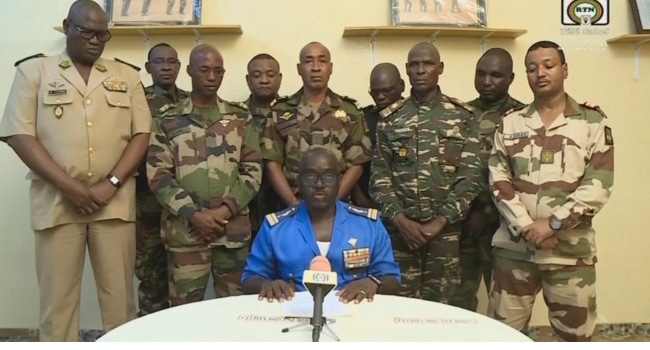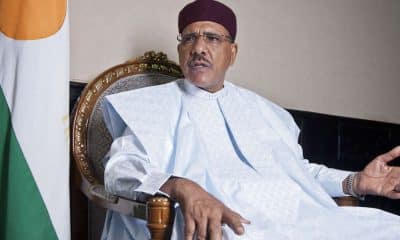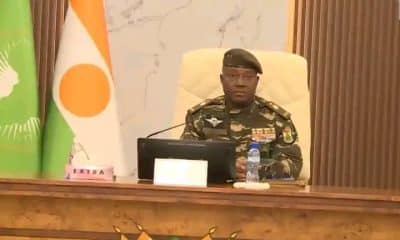Africa News
Ousted Niger President Remains In Custody One Year After Coup

One year has passed since the coup in Niger, and ousted President Mohamed Bazoum remains under strict detention in Niamey by the ruling military regime.
Concerns about a potential trial are mounting among his supporters and close associates.
Recall that Bazoum was deposed on July 26, 2023, by General Abdourahamane Tiani, the leader of his presidential guard.
Elected in 2021, Bazoum has refused to resign and continues to assert his legitimacy as the president of the Sahelian nation.
Since the coup, he and his wife, Hadiza, have been held at the presidential palace in Niamey. Bazoum’s last public appearance was on August 19, 2023, when he was seen on national television during a visit by a Nigerian mediator.
The conditions of his detention have since worsened. In October, the military accused him of attempting to escape, an allegation his lawyers have denied.
Bazoum’s phone has been confiscated, and only his doctor is allowed to visit him twice a week.
Despite these harsh conditions, Bazoum remains resolute. According to his communications advisor, Hamid N’Gade, Bazoum is physically well and maintains high spirits, showing no intention of resigning.
“According to him, they are physically fine. Their spirits are very high. The president is committed to continuing his resistance.
“He is a man of conviction and a staunch republican. Resigning makes no sense to him,” his communications advisor, Hamid N’Gade, told AFP.
He remains committed to resisting the military regime, which a source close to him describes as a symbol of courage and democracy. His son, Salem Bazoum, who was initially detained with him, was provisionally released in January and relocated to Togo.
Allegations Against Bazoum
Despite the Economic Community of West African States (ECOWAS) ordering Bazoum’s release in mid-December, the military has ignored the ruling, and Niger has since withdrawn from ECOWAS.
Last month, the military-created Court of State revoked Bazoum’s presidential immunity. He faces charges of “conspiracy to attack the security and authority of the state” and “treason.”
The military accuses him of contacting French President Emmanuel Macron and US Secretary of State Antony Blinken to seek support for armed intervention during the coup.
Mohamed Seydou Diagne, one of Bazoum’s lawyers, argues that the court lacks legitimacy, as its members were appointed by a leader who was never formally sworn in.
“This court has no legitimacy. These people were appointed by a putschist who was never sworn in,” said Mohamed Seydou Diagne, one of Bazoum’s lawyers.
Potential Trial
Bazoum’s immunity removal paves the way for a trial, though no date has been scheduled. The charges carry severe potential penalties: treason can result in the death penalty by shooting, and conspiring against state authority could lead to life imprisonment.
“The crime of treason carries the death penalty, death by shooting, which is still in force in Niger even though it has not been carried out for thirty years,” said Moussa Coulibaly, former president of the Niger Bar Association and Bazoum’s lawyer.
A trial would offer Bazoum his first opportunity to speak publicly since the coup. However, Diagne criticized the process, describing it as an exceptional jurisdiction lacking fair trial guarantees. He labeled it a “parody of justice” aimed at securing Bazoum’s conviction.
“It will only be a parody of justice, a continuation of what they have started. They are determined to convict him at all costs,” added Oumar Moussa, his deputy chief of staff.
Support for Bazoum
Initially, many Western leaders demanded Bazoum’s immediate release. ECOWAS imposed economic sanctions on Niger’s military rulers and even threatened military intervention to reinstate him. However, no intervention occurred, and sanctions were lifted in February.
In recent months, international calls for Bazoum’s release have diminished. A French diplomatic source expressed concern about the pressures exerted by the junta and the looming “legal sham.”
An International Monetary Fund spokesman, whose aid to Niger has resumed, declined to comment on Bazoum’s situation, citing non-interference in member states’ political matters.
Rebel groups in Niger advocating for Bazoum’s return have recently claimed responsibility for attacks on a significant oil pipeline.








